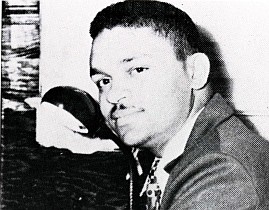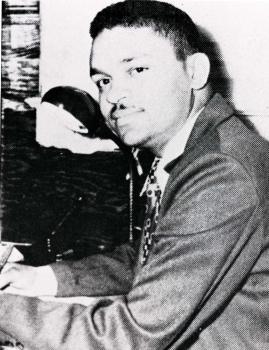UTC tells desegregation history in documentary
Friday, January 1, 1904
FALL 2011 ENROLLMENTBroken down by ethnicity/raceWhite: 8,199 or 71.7 percentBlack: 1,352 or 12 percentHispanic: 310 or 2.7 percentAsian/Pacific Islander: 214 or 1.9 percentSource: University of Tennessee at ChattanoogaFALL 2010 FACULTYFull-time teaching faculty by ethnicity/raceWhite: 394 or 84.7 percentBlack: 30 or 6.5 percentAsian: 20 or 4.3 percentHispanic: 7 or 1.5 percentSource: University of Tennessee at Chattanooga
Thirty-two-year-old Horace Traylor, wearing a blue suit, tie and matching handkerchief and shiny black shoes, arrived at the Registrar's Office of the University of Chattanooga.
He stood in line for about 10 minutes, then someone on the other side of the desk saw him -- he was the only black in a group of 100 or 200 people waiting to sign up for classes.
"[The registrar] put his hand around my shoulder and said, 'You know we don't admit black people,'" said Traylor, now 80.
"I know. That's why I'm here. To change that," Traylor responded.
It was the spring of 1963.
Traylor is one of the voices of the documentary, "Reaching the Light: The Story of Desegregation of the University of Chattanooga," which premiered Tuesday at the University of Tennessee at Chattanooga.
The documentary was put together by faculty and students in the school's Communication Department to commemorate UTC's 125th anniversary and 50 years of black achievement in the UT system.
The 45-minute film is a way to tell the story of the university and desegregation, said Betsy Alderman, head of UTC's Communication Department. It covers the period of 1960 through 1966, from the school's discussions and votes to desegregate to the first degree awarded to a black student -- Traylor, who graduated from the University of Chattanooga in 1965 with a master's in education.
The producers of the documentary conducted more than a dozen interviews with former students, faculty, administration and civil rights leaders, said Alderman, who did lot of the research and wrote the script.
"We wanted to tell the story in the context of what was happening nationally with the civil rights movement as well as what was going on in the city of Chattanooga because at the time there were real efforts in Chattanooga city government to peacefully desegregate public facilities," she said.
Traylor -- then president of the Chattanooga City College, a predominantly black junior college -- was sent back home in 1963, but he returned to the same Registrar's Office and to the same registrar a couple of months later. His experience, though, was much different.
There were a couple of hundred people waiting to register, but instead of the room going silent when he tried to sign up, they welcomed him with a smile. And he wasn't the only black in line.
Between his two visits, the board of trustees of the then-private University of Chattanooga decided to admit black students to its graduate summer program. The decision came almost a decade after 1954's Brown vs. Board of Education, the U.S. Supreme Court decision that legally ended school segregation.
Betty Jackson Williams, one of the first black undergraduate students, said the documentary is a trailblazer for the university.
"It shows you can make a difference and that making that difference starts with improving yourself," she said.
Williams, now 70, lived close to the university while growing up. She would walk past the entrance on McCallie Avenue every time she went to the public library. But even as a 5-year-old, she knew she couldn't go to that school.
"It was just understood it was a white college," she said.
She went to school in Alabama but returned to Chattanooga before finishing her trade degree to be a tailor because she couldn't afford school. She got married, had a baby, but she was determined to finish her degree.
She had known she was going to college since she was in sixth grade. Her mother would come home from working as a presser in a laundry downtown with steam burns up and down her arms.
"I knew there was a better way," said Williams. "She always told my brothers and I we could be whatever we wanted, but we had to work very hard."
And within 30 minutes of the University of Chattanooga board's vote to allow black undergraduate students enroll, Williams was at the school, getting an application. She graduated in 1966.
She worked in public schools for 38 years and retired in 2005 as the principal of Calvin Donaldson Elementary School.
The university and the community have made great progress, Traylor said, but there's still work to be done.
Last fall, 12 percent of the students at UTC were black and less than 3 percent Hispanic, figures show, while in 2010, 85 percent of the full-time faculty were white.
But it goes beyond numbers and minorities, said Traylor, who is retired and lives in Florida.
"Everybody should believe that 'If I apply myself, if I do the work, if I do the study, the world will be mine,'" he said. "And when people believe that, you have a better community."
University of Chattanooga Desegregation Timeline
1886 - Chattanooga University incorporates and opens. Two blacks, William Wilson and Louis Gibbs, arrive on opening day, but are turned away.
1961-62 - State-supported universities in Tennessee begin to admit blacks.
February 1963 - The University of Chattanooga board of trustees meets to authorize "temporary" and "limited" integration of the graduate programs for only the summer sessions.
Summer 1963 - Horace Traylor and eight other blacks enter the graduate program and the school is peacefully desegregated.
May 11, 1964 - The UC board of trustees votes to admit all qualified students "without regard to race" allowing black graduate students to enroll in all semesters and undergraduate students in September 1965.
Fall 1965 - The first black undergraduate students enroll at UC.
1965 - Horace Traylor becomes first black student to receive a master's degree from UC.
1966 - Betty Jackson Williams becomes first black undergraduate student at UC to earn a degree.
Source: Betsy Alderman, head of the Communication Department at UTC

